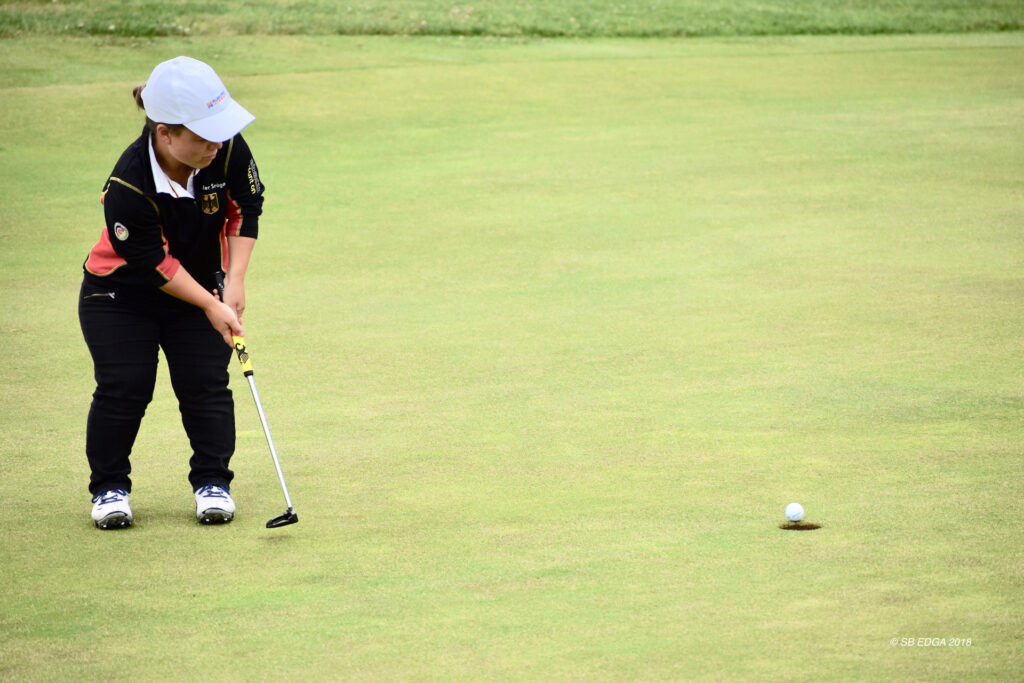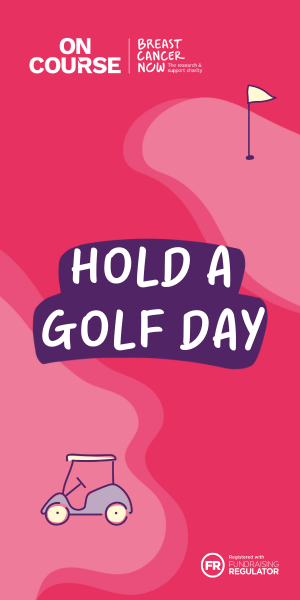EDGA, the international body for disability golf, shares the story of German player Jennie Sräga, who was born with Achondroplasia
Jennie Sräga plays off a low single figure handicap, and achieved national team recognition in her home country of Germany before the age of 17-year-old.
Jennie started golf aged six with her older sister Steffi. At that age she found it a bit boring ‘just putting’ but she and Steffi enjoyed it when they were allowed sometimes to drive the golf cart for a few yards.
As Jennie started to show more interest in the game, parents Sonja and Uwe were quick to recognise her potential to enjoy golf. They arranged for Graham Pottage, a trainer at their home club of Ulm, to help coach Jennie and it wasn’t long before she started to improve her golf skills.
Dad Uwe is a physiotherapist by profession. Which proved very beneficial for Jennie growing up, she said:
“It is good that Dad is a physio, especially when I have to have rehab, like when I had my legs straightened.”
Four operations over a short period to correct her ankles were necessary, but with the help of her family, she soon got back to competing.
Believing in herself to achieve her goals
When it came to golf Jennie always believed in herself, she said:
“When I started thinking properly and practicing, I realised that I could beat others. I had to learn to believe in myself, and then I could reach my goals. If you find a sport like golf, you have only to keep doing it and never mind what the others say. It’s your hobby, and don’t let the others stop you playing.”
The two sisters spurred each other on, and so it is no surprise that both have low handicaps, although Steffi is slightly ahead just now.
Jennie, now 21-years-old, knows where she needs to develop her game.
“In my swing, the radius is shorter so I can’t hit the ball that far, so I have to concentrate more on putting and chipping. Physically, I have to get stronger and optimise everything so that I don’t make too many mistakes.
“I’ve learned lots. I have to keep concentrating. I have learned from some rounds in golf that were not so good, to just stay focused and even then you can still reach your goals.”

"When they look different at me, I can think, yeah, I’m special, this makes me feel more outstanding"
It is not only at golf where Jennie excels: she recently graduated from high school and is now studying for a degree in Pharmacy at the University of Würzburg in Germany. Her friends at college simply treat her as they would anyone else, but that is not always the case for visitors to the school or others who meet Jennie for the first time. She explains:
“They always look, and I can tell they are thinking ‘Oh, there’s someone different’, but I can handle it, it’s quite normal for me.
“When they look different at me, I can think, yeah, I’m special, this makes me feel more outstanding. Of course, the alternative way to look at it is not nice, especially if they look at me like I’m some sort of attraction.”
Being born with Achnodroplasia
Jennie was born with Achondroplasia, which is commonly called short stature, and she is motivated to help others know about her disability.
“I think one reason why people with disability get separated from the others is those non-disabled people don’t think they can ask someone about my disability. Perhaps they feel it is too direct or too personal? I think this barrier could be an artificial problem. If we people with disability are more open and simply say ‘Hello, my name is Jennie, I saw that you looked a little strange at me, do you have any questions?’”
Getting more women with a disability into golf
Although Jennie enjoys the competitive side of the game she realises that just getting more women with a disability to start playing golf would be a step in the right direction.
“I compete in regular events and I think it’s quite exciting to be the only woman in these tournaments. It’s a pity that women’s golf has not got so big a demand in society and especially when there are women with disabilities, it’s really a pity.”

Jennie got an invitation to play in the ‘Diversity Cup’, which was played at the Solhiem Cup in 2019. Six women players with disability from EDGA were joined by celebrities and juniors to bring awareness to the inclusive nature of the sport.
“It was an incredible experience, to play the same course as the leading women golfers from Europe and the United States, and to get the applause from the crowds was brilliant. I even signed an autograph or two for the fans. The first tee noise was a highlight, but my hope is that people who saw us play can now realise that golfers with a disability are not only able to compete, but also that we have some really good players.”
Jennie has advice for others living with any disability.
“Just live your life. We can’t change it – we have to accept it and so stay strong. Believe in yourself, after all that’s what makes us all human.”
You can read more about Jennifer and more inspiring stories from the EDGA players at www.edgagolf.com.
Words by Ben Evans.















